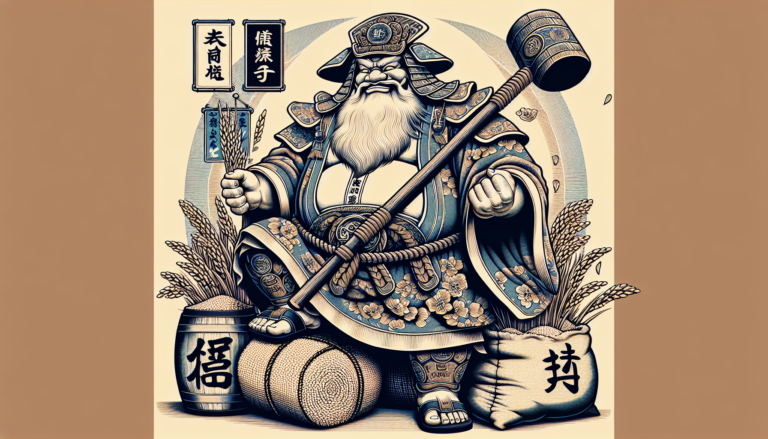As you initiate a journey to uncover the secrets of Japanese mythology, you may stumble upon a fascinating figure known as Daikokuten. This enigmatic being has captivated the imagination of many, but what lies behind the mystique? In this exploration, you’ll investigate the world of Shintoism and Buddhism to discover the origins, symbolism, and significance of Daikokuten, a deity often depicted with a mallet and sack of treasures. Prepare to unravel the mysteries surrounding this intriguing figure and uncover the richness of Japanese cultural heritage.
Origins of Daikokuten
Japanese Folklore Roots
Ancestral myths and legends have played a significant role in shaping the character of Daikokuten. In Japanese folklore, this deity depicts an influential, benevolent figure associated with wealth, prosperity, and good fortune. You may notice that Daikokuten’s image is often accompanied by symbols of abundance, such as rice, gold, and treasure.
Buddhist Influences
Influences from Buddhist mythology have also contributed to the evolution of Daikokuten. As a Buddhist deity, Daikokuten can grant wishes and bring prosperity to those who worship him.
A closer examination of Buddhist influences reveals that Daikokuten is often associated with the Indian deity, Mahakala. This connection highlights the cultural exchange and syncretism between Indian and Japanese Buddhist traditions. You may find it fascinating to explore how these influences have shaped the character and significance of Daikokuten in Japanese culture.
Characteristics of Daikokuten
Daikokuten’s most fascinating aspects lie in its characteristics, which reveal the depth of this deity’s significance in Japanese mythology.
Physical Appearance
With a stout build and a beaming smile, Daikokuten is depicted as a jovial figure, typically shown carrying a mallet and standing on bales of rice. This physical appearance is a testament to its association with wealth, prosperity, and abundance.
Symbolism and Attributes
One of the most striking aspects of Daikokuten is its symbolism, which is deeply rooted in Japanese culture. This deity is often associated with the earth, fertility, and good fortune, making it a revered figure in many Japanese households.
Another fascinating aspect of Daikokuten’s symbolism is its connection to the concept of “Yakudoshi,” or unlucky ages. In Japanese tradition, certain ages are considered particularly unfortunate, and Daikokuten is present to offer protection and good fortune during these times. As you examine the world of Daikokuten, you’ll discover that this deity’s attributes are multifaceted and far-reaching, revealing a rich tapestry of cultural significance and spiritual importance.
Significance in Japanese Culture
It is no surprise that Daikokuten, a symbol of prosperity and good fortune, holds significant importance in Japanese culture.
Role in Business and Commerce
On the streets of Japan, you’ll often find Daikokuten’s image displayed in shops and businesses to attract wealth and success. Many entrepreneurs and business owners worship Daikokuten as a guardian deity, seeking his blessings for their ventures.
Associations with Good Fortune
Associations with Daikokuten are deeply rooted in Japanese folklore, where he is known as a bringer of good luck and prosperity.
With his majestic presence, Daikokuten offers to ward off evil spirits and misfortune, replacing them with abundance and joy. In your journey to understand this fascinating deity, you’ll discover that his associations with good fortune extend beyond material wealth, encompassing harmony, longevity, and overall well-being.
Summing up
As you’ve investigated Japanese mythology, you’ve discovered the significance of Daikokuten, the god of wealth and prosperity. You’ve learned how this benevolent deity, often depicted with a mallet and sack of treasures, brings good fortune and abundance to those who honor him. As you reflect on your journey, remember that Daikokuten’s wisdom teaches you to appreciate life’s simple joys and cultivate gratitude for the riches surrounding you.
